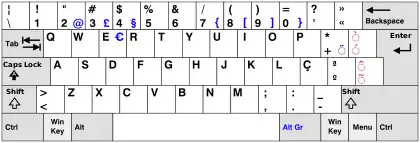| Languages of Portugal | |
|---|---|
| Official | Portuguese |
| Regional | Mirandese, Barranquenho, Minderico, Algarvean |
| Minority | Caló |
| Foreign | English (27%)[1] French (15%) |
| Signed | Portuguese Sign Language |
| Keyboard layout | |
| Source | ebs_243_en.pdf (europa.eu) |
The languages of Portugal are Portuguese, Mirandese, Barranquenho, Minderico, and Portuguese Sign Language. Historically, Celtic and Lusitanian were spoken in what is now Portugal.
Modern
Portuguese is practically universal in Portugal, but there are some specificities.

Portuguese dialects of Portugal
- Dialects of Portuguese in Portugal
- Alentejan Portuguese
- Algarvian Portuguese
- Azorean Portuguese (micaelense)
- Beiran Portuguese
- Estremaduran Portuguese
- Northern Portuguese (interâmnico)
- Madeiran Portuguese
- Barranquenho – In the town of Barrancos (in the border between Extremadura, Andalusia and Portugal), a pronunciation heavily influenced by Spanish is spoken, known as Barranquenho.
- Caló language – spoken by the Romani people in Portugal
- Minderico – a sociolect or argot spoken in Minde, practically extinct
- Mirandese language – A dialect of Astur-Leonese spoken in Miranda do Douro in northeastern Portugal, recognized officially as a minority language in 1999.
- Portuguese Sign Language
In addition, it is estimated that 42.8% of Portuguese adults (aged 18-64) spoke English, 15.4% spoke French and 10.6% spoke Spanish as foreign languages as of 2016.[2]
Historically
Other languages have been extensively spoken in the territory of modern Portugal:
Pre-Roman languages

Pre-Roman languages of Iberia c. 200 BC.
Roman, Post-Roman and Medieval languages
See also
References
- ↑ "SPECIAL EUROBAROMETER 386 Europeans and their Languages" (PDF). ec.europa.eu. Archived from the original (PDF) on 2016-01-06.
- ↑ "Portugueses falam cada vez mais (e melhor) línguas estrangeiras". www.dn.pt (in European Portuguese). 2017-12-15. Retrieved 2023-10-30.
External links
This article is issued from Wikipedia. The text is licensed under Creative Commons - Attribution - Sharealike. Additional terms may apply for the media files.

